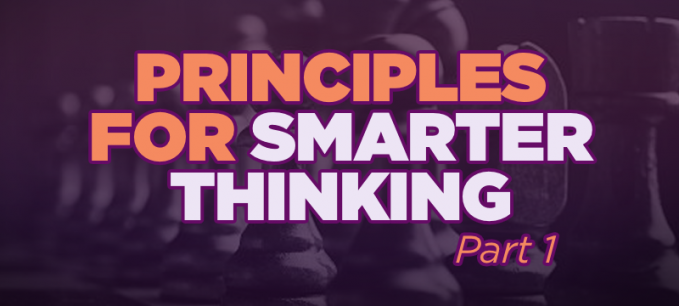Principles for Smarter Thinking (Part 1)

This article is part of the Smarter Thinking Series, which includes a range of mental models and tools to improve general decision making, business acumen, and critical thinking.

1) Don't Confuse Humility With Weakness
One of the most groundbreaking thinkers in the history of human thought had a real bee in his bonnet about intellectual arrogance. His name was Socrates. And he was more badass than Rambo and Rocky combined.
If we’re to trust the historical record, the intellectually brilliant yet virtually penniless old man eschewed a life of political power and fortune for the road less travelled—a career of questioning and doubting in the ultimate search for truth, the holy grail of philosophy: the quest for wisdom.
Along his travels around the city streets of Athens, Socrates, like Bruce Lee in Enter the Dragon, challenged anyone and everyone, young and old, amateurs and experts. The black belt in logic trounced many “pretenders to knowledge”—people who at first appeared very smart or accomplished, but did not really possess the deep wisdom they claimed when subjected to his next level intellectual Kung Fu.
 Not long before his death, Socrates came to the realisation that avoiding self-delusion was integral to the cultivation of wisdom. The famous (mis)quote, "All I know is that I know nothing" is an oversimplification of his views, but the basic sentiment behind this idea—that Socrates was willing to fight his pretensions to knowledge and thereby embrace the discomfort of uncertainty—remains, I think, one of the most important and timeless lessons in all philosophy.
Not long before his death, Socrates came to the realisation that avoiding self-delusion was integral to the cultivation of wisdom. The famous (mis)quote, "All I know is that I know nothing" is an oversimplification of his views, but the basic sentiment behind this idea—that Socrates was willing to fight his pretensions to knowledge and thereby embrace the discomfort of uncertainty—remains, I think, one of the most important and timeless lessons in all philosophy.

2) Your Confidence in Your Opinion Should Not Exceed Your Grasp of the Evidence
What do Leonardo da Vinci, Aristotle, and Bertrand Russell all have in common?
Among other things, these names each belong to a rare class of super genius known as a "polymath" (someone who is incredible at multiple subjects).
Unlike the polymaths, most of us are laypeople on nearly all subjects—but we don't always act like it.
Think about a subject (or a hobby) that you love.
Now think about what the general public knows about your subject.
Is there a knowledge gap?
I'm guessing there have probably been times when you’ve witnessed non-experts assert things about your industry, work, or specialty subject that you know full well to be overly simplistic, exaggerated, confused, or just plain wrong.
The principle should cut both ways: if you wouldn't want someone in the general public making confident declarations about a dynamic subject close to your heart, then it's probably a good idea to temper the force of your own opinions in matters where your understanding is limited.
Like the old adage about saying nothing if you don’t have anything kind to say, sometimes the smartest opinion in the room is silence.

3) Mind the Standards You Leave Behind
You're a hiring manager. (Go with me on this one.)
After reading an article titled "The Best Interview Question of All Time," you decide to implement the classic "What's your greatest weakness?"
You don't conduct any background research about its efficacy. Why bother? The author of the article—a famous CEO—offered a compelling story based on first-hand experience. You trust the CEO.
Months later, you are having lunch with an amateur day trader friend who recommends an “amazing” new investment strategy. After further discussion, you discover there is no real supporting evidence behind the claim. Your friend has essentially taken a financial guru’s advice at face value.
Annoyed, you call your friend “irresponsible” and "reckless" for relying on anecdotal evidence.
Um. Wait a second. Did you forget something?
You just scolded your friend for making a decision based on reasoning that is comparable to a standard you once applied to your work. Even if you've got a clear point in the realm of logical analysis (i.e. anecdotal evidence can be seriously flawed), as a matter of moral analysis, you’ve just taken a shotgun and blown off your leg (i.e. condemning someone for something you have done isn't very morally upright behaviour). Socrates would not have been impressed.
Every day of every year, our decisions leave behind a trail of standards—standards that we should be mindful of before throwing stones at others, lest we find our house of glass falling on our head.
Many more principles to follow in this series.
Topics:
Smarter Thinking
Theo Winter
Client Services Manager, Writer & Researcher. Theo is one of the youngest professionals in the world to earn an accreditation in TTI Success Insight's suite of psychometric assessments. For more than a decade, he worked with hundreds of HR, L&D and OD professionals and consultants to improve engagement, performance and emotional intelligence of leaders and their teams. He authored the book "40 Must-Know Business Models for People Leaders."


/10%20of%20the%20best%20people%20to%20follow%20on%20linkedin.png?width=374&name=10%20of%20the%20best%20people%20to%20follow%20on%20linkedin.png)
We Would Like to Hear From You (0 Comments)